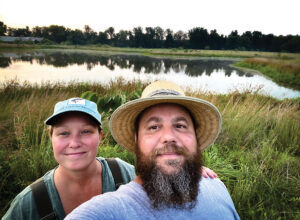
Derek and Libby Ervin of Glacier’s End farm, Johnston City, have an unlikely journey from suburban Chicago to southern Illinois. The couple inherited his grandparent’s farm in Southern Illinois Electric Cooperative territory. With no farming experience, they tried to navigate growing their own fruits and vegetables and looking at ways to start a small business. They took a farm beginnings class in 2016, which is when they were first introduced to the Illinois Stewardship Alliance (ISA) while researching cottage foods.
“While figuring out what we wanted to make, we discovered the stewardship alliance,” says Derek. “The alliance backed the original legislation and has a guide that helps producers navigate the industry. That’s how we got connected with them.”
The Alliance wanted small food producers to have input on new regulations and reached out to cottage producers including the Ervins. They served on a sub-committee making recommendations for the new bill, lobbying for the legislation and testifying before a legislative committee. The legislation expands sales avenues.
Their advocacy on behalf of cottage food producers earned them recognition as the first recipients of the ISA’s Illinois Local Food Changemakers of the Year.
 In 2017, Glacier’s End began selling hickory syrup and apple butter, and their offerings have expanded. Beginning with two or three products, they now make a line of hot sauces, pickles and other fermented items, shrubs, syrups and jams. Shrubs [drinking vinegars] are an infusion of fruit, sugar and vinegar and have many health benefits.
In 2017, Glacier’s End began selling hickory syrup and apple butter, and their offerings have expanded. Beginning with two or three products, they now make a line of hot sauces, pickles and other fermented items, shrubs, syrups and jams. Shrubs [drinking vinegars] are an infusion of fruit, sugar and vinegar and have many health benefits.
“Originally, only direct [face-to-face] sales were allowed. We had to prepare our products in a commercial kitchen to sell it to customers at fairs and festivals,” explains Derek. “With the new legislation, cottage foods can be prepared in home kitchens, sold at those locations or fairs, festivals, pickup, delivery or online, and shipped within the state of Illinois. It’s a game changer for all of us.”
 The Ervins say for someone wanting to start a small food business, selling at farmers markets is valuable. “It gives you the ability and flexibility to find your identity as a small business and define what you do well,” says Derek. “We are considering going on to wholesale our products but starting small like this has really allowed us to find our voice and hone our skills at what we do best. It took several years for us to find it.”
The Ervins say for someone wanting to start a small food business, selling at farmers markets is valuable. “It gives you the ability and flexibility to find your identity as a small business and define what you do well,” says Derek. “We are considering going on to wholesale our products but starting small like this has really allowed us to find our voice and hone our skills at what we do best. It took several years for us to find it.”
“We have several categories we do and use a lot of fresh ingredients,” Libby says. “We may end up with 30-35 shrubs each year using a variety of fruits. If we were a wholesaler, we would need a huge plan for every product and jump through a lot of hoops to make them. Right now, we have flexibility.”
As seasons change, they harvest different fruits and vegetables to use in their products. Adding items purchased from other farms gives them the ability to use seasonality to their advantage.
Illinois Stewardship Alliance
For years, farmers and cottage food producers (products made in a home kitchen) have struggled to market their products. On Jan. 1, that changed when the Home to Market Act took effect. It creates new sales pathways for small businesses. Illinois shoppers can now support their neighbors by purchasing artisan foods previously only available at local farmers markets.
According to Molly Pickering, deputy director of the Illinois Stewardship Alliance, cottage food producers previously had few avenues to market their products year-round and selling from their homes was prohibited.

The Alliance was a natural fit to push new legislation because many cottage food producers are farmers. It seeks to advance Illinois farmers to earn a living by responsibly stewarding the land and feeding communities. It pulls together local food producers and those interested in helping all citizens find access to healthy foods and build community.
In 2020, as the alliance pushed for new legislation, the state virtually closed due to COVID-19 and no legislation was moving forward. In addition, many farmers markets were delayed.
“It was risky,” says Pickering. “Those thinking about selling at farmers markets were worried how many people would come and if they could recoup the expense of having a booth. They had nowhere to sell their products.”
If producers had access to a commercial kitchen, they could sell at fairs and festivals, but according to Pickering, 99 percent of the time they couldn’t sell outside of farmers markets. There was also the question of what to do with fresh produce. Preserving food adds value to farmer’s products and extends its shelf life, giving them something to sell over the winter.
Pickering explains, “They can take their bumper crop of cucumbers and, instead of going into a compost pile, turn them into pickles and have another revenue stream. … Having a strong cottage food industry is a way to open up more sales avenues for farmers and a way to keep money in the local economy, which is part of our mission.”
In 2021, the ISA partnered with Rep. Will Guzzardi (D-39), to pass the new legislation helping home cottage businesses and small farms reach new customers. The legislation passed unanimously.
Getting started
While it’s unknown how many cottage food businesses exist in Illinois, Pickering estimates there are likely 1,000 and the new legislation could increase that number. Her advice for those interested in starting a business is to download the ISA cottage food guide.
“It tells you what you can and cannot make, where you can sell and everything you need to know about labeling your product, food safety regulations and will help you navigate the law,” says Pickering.
She adds that the University of Illinois Extension is another resource with an abundance of information about food safety, including how to keep food safe and selling a safe product. “Always check all food safety regulations before starting,” she says.
The Institute for Justice Clinic on Entrepreneurship, Chicago, has worked on cottage food laws across the nation and helps individuals navigate the law.
Pickering asks everyone to be patient with their health departments. With the new act comes a new registration process. “It will hopefully be standardized across the state, but the new law has new regulations they have to follow. New and current producers will need to go through the registration process.”
At deadline time, work was still being done between the Illinois Department of Public Health and local health departments on how to handle the process.
Learn more
- The Illinois Cottage Food Guide and beneficial information can be found at ilstewards.org.
- Glacier’s End products are available on Facebook or at glaciersend.com.









